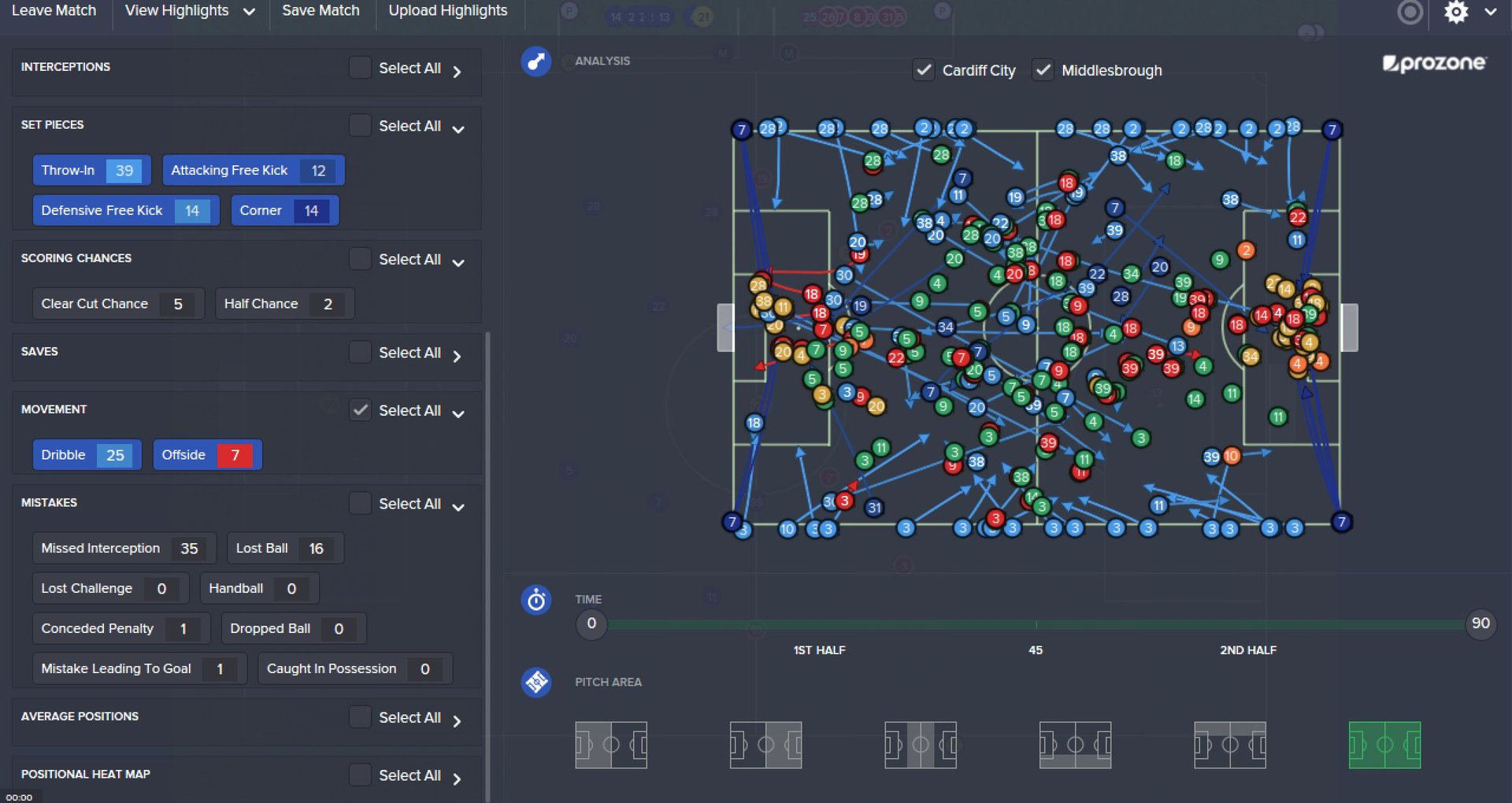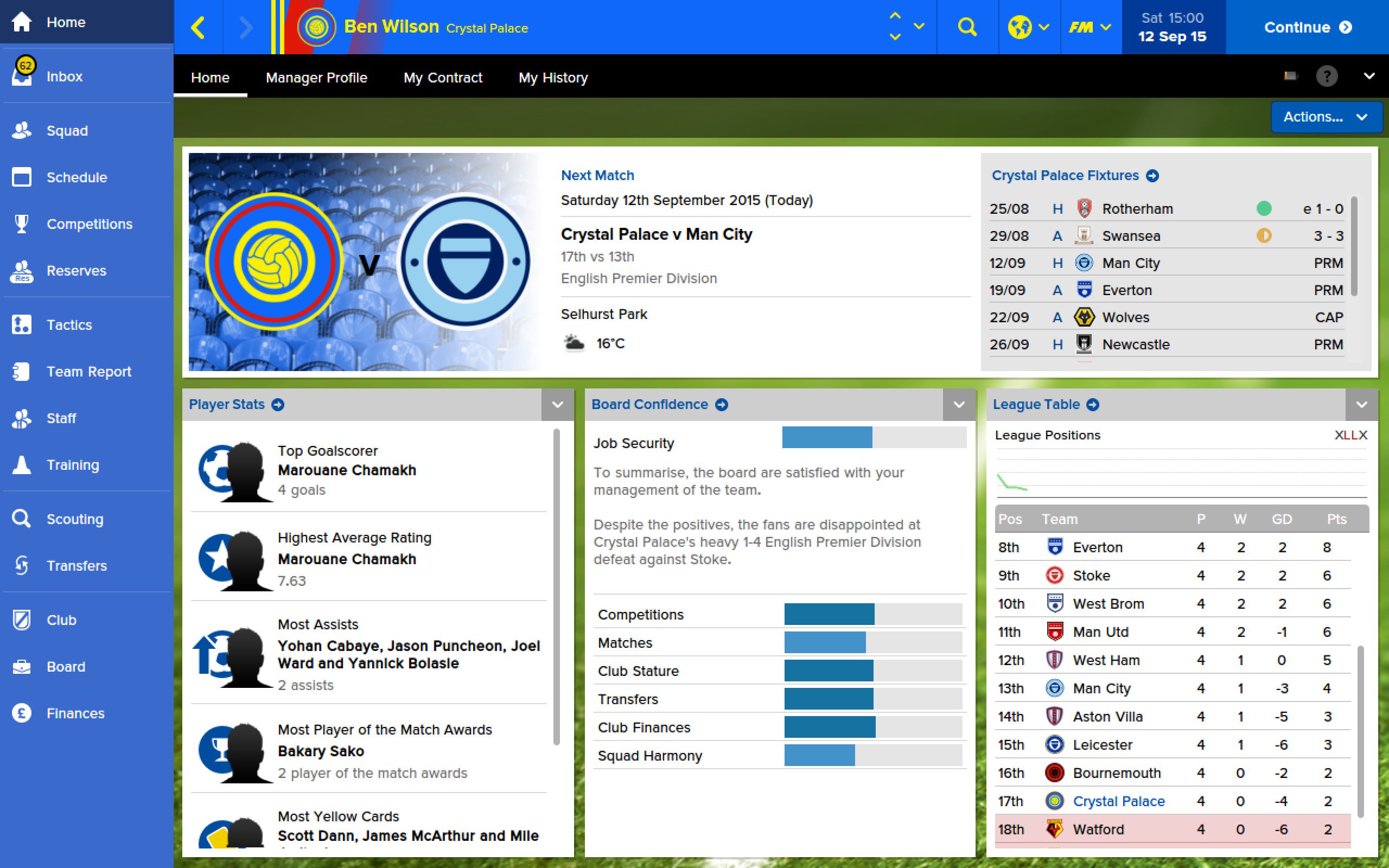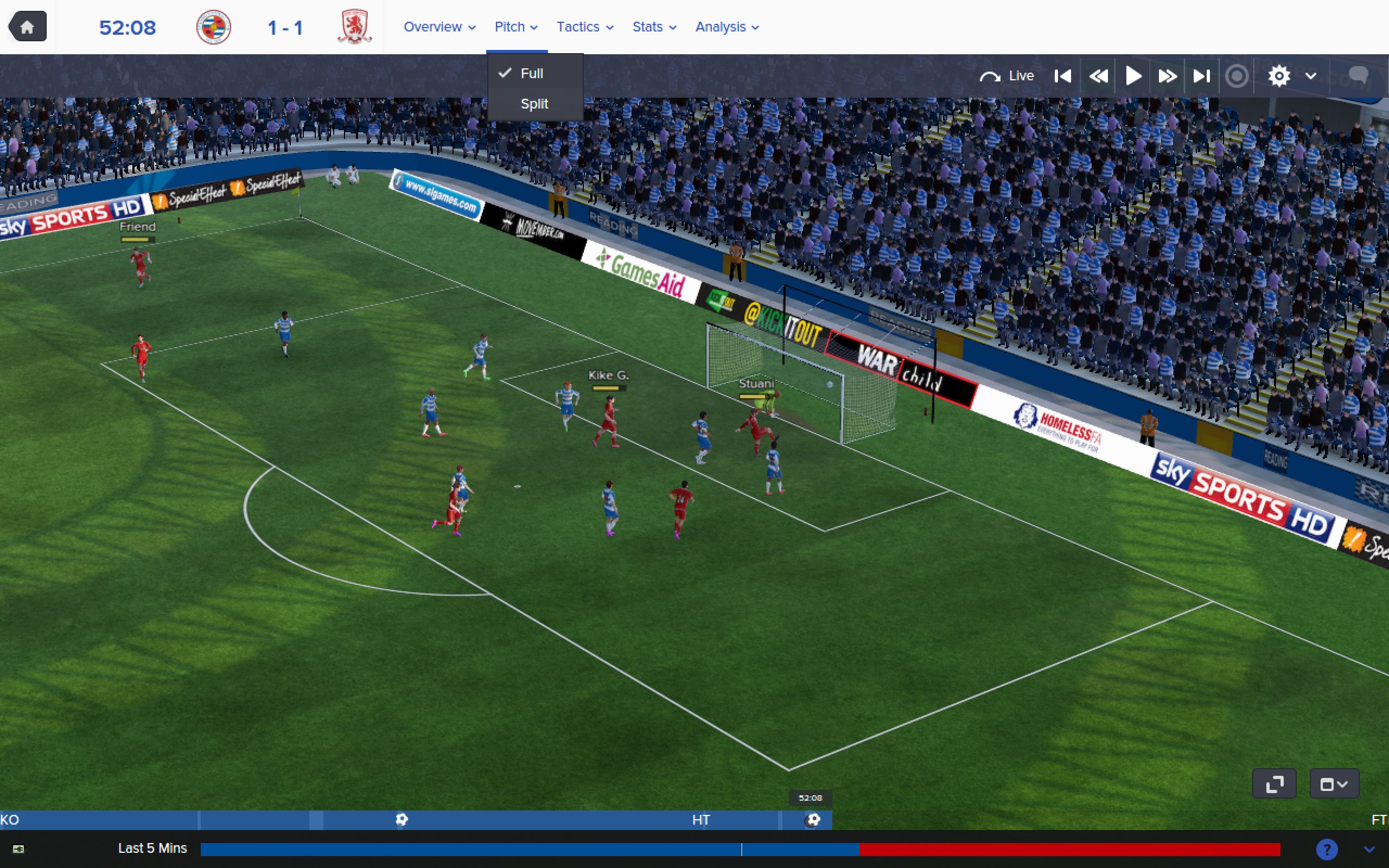Our Verdict
Still untouchable on the footy frontbut shelf life and that inconsistent 3D engine chip away at its tender achilles.
PC Gamer's got your back
What is it? The latest in the venerable series of footie management sims.
Reviewed on: Core i5, NVIDIA GeForce GTX 970, 8GB RAM
Play it on: Core i5, NVIDIA GeForce GTX 970, 8GB RAM
Copy protection: Steam
Price: £35 / $50
Release date: Out now
Publisher: Sega
Developer: Sports Interactive
Link: Official site
Sports Interactive’s legendary dugout sim has endured some polarising seasons. Critics say its modern form is too complex and sprawling. Fans argue it appears that way because it offers all the depth of being a real manager. Boo-boys decry its UI as impenetrable. Converts insist that everything you need is to hand if you only know where to look. And in pretend football as in real life, forumite squabbling ultimately smothers any attempt at serious discussion. At least until everyone concurs that Robbie Savage is a plum.
Let’s kick off with those repeated criticisms—or are they compliments?—then. The main interface is certainly overwhelming for new or lapsed players. Where once player searches, team selection and vital stats were a cursor-click away, now every screen is a spaghetti junction of words and digits and pie charts, constructed upon a foundation of assumed knowledge, from which all roads seem to reach dead ends. The only way for novices to bed in is by initially palming key tasks, such as training and scouting, off to AI-controlled staff members. They perform these roles satisfactorily, but it’s not ideal.
After mastering the menus—this year it took me two hours, novices are looking at 4-5—you see why ardent fans back ‘their’ game so lustily, and praise the deeper features that weren’t there in the supposed golden years. Back then, transfers and matches were the big time sink; now it’s the tiny decisions made every few seconds which tax the grey matter and cause whole weekends to disappear. Do you start a star player returning from injury, despite your physio warning he’ll only last 30 minutes? Do you bollock an underperforming full-back at half-time, or calmly reassure him he can turn it round? At a press conference, do you fancy QPR or Cardiff to win at the weekend—and if you choose one, will the other use that as dressing room bulletin-board material next time you meet?

Like God himself having a kick-around in the Amazon, all these actions can trigger a domino effect however innocuous they appear. Football Manager is actually something of a misleading title; these days it’s more like Football Micro-Manager. And while handling the minutiae of training ground life is a relatively new, and impressive, feature, developer Sports Interactive has by no means lost track of what got it this far.
Transfer negotiations are devilishly fun. Agree a fee for a player and you’re invited to sit down with his agent to negotiate not only a wage, but clauses such as promotion pay rises and even his fee for being an unused sub. It’s especially amusing to toy with the middle man by upping your target’s salary to slightly more than that requested, then greatly reducing his personal cut. At lower league clubs, such penny pinching plays a vital role in your chances of long-term success—one major signing’s weekly appearance fee might cover the wages of three less-talented squad players. Which do you choose? Why are you lying awake at 2am in the morning pondering this? Because that’s the very essence of Football Manager.
Matchdays, too, are wonderfully elaborate, with press conferences, team talks and intricate tactical options creating the sense that each is a unique occasion. There’s no breezing through weeks of the season in an evening anymore. That might sound like a negative to anyone who’s skipped a few editions, but it’s not once comfortably embedded. Seeing your lads equalise from a whipped cross minutes after you specifically demand that type of delivery is fists-to-the-skies joyous. After a narrow win, I celebrate the positive dressing room reaction to my warm-down words almost as heartily as the goal that secured it.
The 3D engine still doesn’t feel like a true representation of top-level football.
There is a small caveat to this matchday enjoyment. Seven years since its introduction, the 3D engine still doesn’t feel like a true representation of top-level football. It’s passable, sure, but in a series known for excellence in everything it does, ‘passable’ equals disappointing. No one expects it to look like FIFA; the issue is that at least once per game a player will do something completely absurd that immediately shatters the illusion of reality.
Before anyone says ‘but players ignoring instructions is part of being a manager’, I present my tipping point: a home fixture vs MK Dons, 12 games into a promising Middlesbrough career. At 0-1 down my team has been instructed to stick to a narrow 3-1-3-1-2 formation and pump balls into the box. With seconds left, central defender Jonathan Woodgate pops up on the right wing, level with the edge of the penalty area. He has time to cross, yet decides to backtrack, and backtrack, and backtrack. All the way to the halfway line. Where he’s tackled. From there, MK breakaway for a match-sealing second goal. Swears uttered. Walls kicked. Mouse flung across the room.
I’ve since switched my highlight settings to ‘key’—goals, vital saves, rebounds off the woodwork—and am finding the game as addictive as ever; the rest of the time, my imagination brings the text-based commentary to life just as in Championship Manager’s glory days. I’m content with that, but it feels backwards to have improved a game by marginalising a lauded feature.

Returning players will be aware that many of the element discussed so far were present in 2015. What’s in FM 2016 for them, then, other than updated squads? Firstly, the option to create your own avatar, in order to roam the touchlines of those 3D stadia. It’s, er, awful. Even with four ways to amend your jawline and 13 separate nose sliders, it’s impossible to make in-game-you look like anything other than a Stone Roses tribute band reject. The idea behind the feature is welcome, but needs significant refinement.
Much better is the seamless integration of analysis tool Prozone. Its inclusion enhances proceedings on both a superficial level—delivering reams of stats from elsewhere in the world via a loading-screen ticker—and hands-on one, enabling you to study any performance in surgical detail. Need to know the distance run by a particular player, exact placement of every single shot, trajectory of all set-pieces and outcome of every mistake before selecting next week’s team? All there, along with dozens of other insights, presented in surprisingly digestible form.
Also new are a useful set-piece editor and the ability to watch highlights packages of AI games. Yet the game suffers from the continuing absence of two innovations made by a contemporary. Out Of The Park Baseball has long enabled users to both play classic leagues, and—crucially—carry over saves from one release to the next. For FM to keep up with its former stablemate—SI actually published it between 2005 and 2007—it really needs to introduce the latter option. This is deeper and more detailed than ever, which only makes it extra galling that your 120-hour save game will be consigned to the Trash folder in 12 months’ time.
Still untouchable on the footy frontbut shelf life and that inconsistent 3D engine chip away at its tender achilles.


